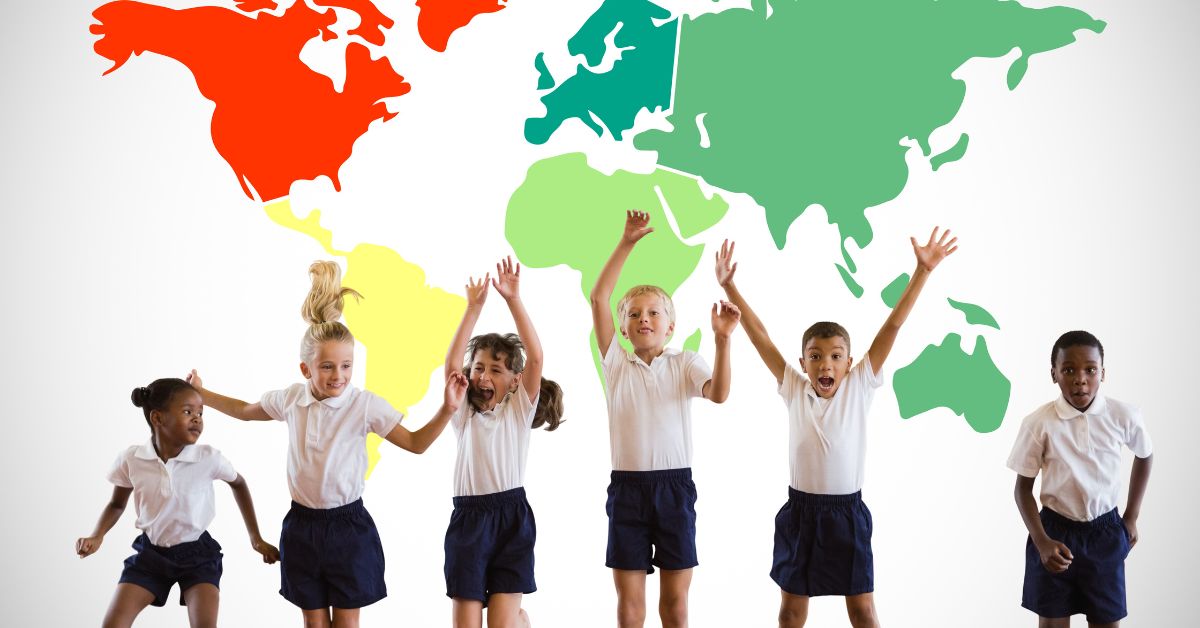In recent decades, the concept of a “globalised world” has gained widespread recognition and significance. This phenomenon has facilitated unprecedented levels of international connectivity, allowing for ease of communication and travel across the globe. As international barriers diminish, we face the challenge of navigating diverse cultures and ideologies. Global citizenship equips individuals with the skills to engage effectively in this multicultural landscape.
This article will explore the definition of global citizenship, its importance in today’s society and benefits of International School for your kids. We’ll examine why developing these competencies are crucial for success in our globalised era.
Table of Contents
ToggleWhat is global citizenship?
Global citizenship is a mindset and practice that goes beyond national identities. It encompasses the idea that we all belong to a broader, global community and have responsibilities that extend beyond our immediate surroundings. A global citizen recognises the interconnectedness of the world’s social, economic, and environmental challenges and feels a sense of duty to address these issues collectively.

Global Citizenship Skills
Certain skills are essential to effectively navigate our interconnected world. These skills form the foundation of global citizenship education and include:
1. Cross-cultural Communication
The ability to interact effectively with people from diverse backgrounds, understand cultural nuances, and adapt communication styles accordingly.
2. Critical Thinking
Analysing complex global issues from multiple perspectives, questioning assumptions, and proposing innovative solutions to multifaceted problems.
3. Empathy
Understanding and sharing the feelings of others, regardless of their cultural background, to build meaningful cross-cultural relationships and promote social justice.
4. Adaptability
Being flexible and open to new ideas, thriving in diverse environments, and adjusting behaviour in different cultural settings.
5. Foreign Language Proficiency
Learning languages to bridge communication gaps and understand the cultural context embedded in language.
6. Digital Literacy
Leveraging technology to connect and collaborate globally while navigating the online world responsibly and critically.
7. Environmental Awareness
Understanding the global impact of local actions on the environment and promoting sustainable practices in daily life.
Crucially, this cultivation should begin early. Global citizenship for kids is vital in raising socially responsible individuals. This early exposure develops broader worldviews and cross-cultural skills from a young age, preparing them to address international challenges and contribute positively to our interconnected world.

Benefits and Importance of Global Citizenship
Embracing global citizenship offers numerous advantages, both on a personal level and for society at large. The benefits and importance of global citizenship are closely intertwined, highlighting why this concept is crucial in our interconnected world:
1. Enhanced Career Opportunities and Innovation
In an increasingly globalised job market, employers value individuals with a global perspective and cross-cultural skills. The exchange of ideas across cultures often leads to creative solutions and technological advancements, driving innovation in various fields.
2. Broader Perspective and Informed Decision-making
Global citizens develop a more comprehensive understanding of world issues, leading to more informed decision-making. This broader perspective is crucial for addressing complex global challenges effectively.
3. Personal Growth and Reduction of Prejudice
Exposure to diverse cultures and ideas fosters personal development and self-awareness. By promoting understanding and empathy, global citizenship helps combat discrimination and xenophobia, contributing to a more inclusive society.
4. Positive Social Impact and International Cooperation
Global citizens are more likely to engage in activities that benefit communities beyond their own, contributing to global progress. This fosters international cooperation, as individuals are more inclined to support and engage in cross-border collaborations to address global challenges.
5. Improved Problem-solving Skills and Sustainable Development
Understanding complex global issues enhances one’s ability to tackle challenges creatively. A global perspective encourages more sustainable practices and lifestyle choices, contributing to long-term environmental and social sustainability.
6. Peace-building and conflict resolution
Global citizens are more inclined to seek peaceful resolutions to conflicts and promote diplomacy. This attitude is essential for maintaining international stability and fostering a culture of peace.
7. Educational and Cultural Enrichment
Global citizenship promotes lifelong learning, encouraging individuals to continually expand their knowledge of world cultures, languages, and global issues. This ongoing education enriches personal experiences and broadens cultural horizons.
8. Addressing Global Challenges Collectively
As many of today’s most pressing issues—climate change, pandemics, and economic disparities—transcend national borders, global citizenship fosters a collective approach to finding solutions. It encourages shared responsibility and collaborative action on a global scale.
The importance of global citizenship lies in its potential to create a more harmonious, sustainable, and prosperous world. It encourages thinking beyond immediate surroundings and considering the broader implications of our actions. In our interconnected era, cultivating global citizenship is essential for navigating shared challenges.
In conclusion, global citizenship is crucial in our interconnected world. Embracing its principles equips us and future generations with the tools to navigate complex global challenges. As we face increasingly global issues, cultivating global citizenship is essential for our collective future. International School in Bangkok plays a vital role in preparing the next generation to thrive in and contribute positively to our interconnected world.
SISB (Singapore International School of Bangkok) exemplifies this approach, prioritising global citizenship in its curriculum. By attending SISB, students are immersed in a diverse community, learning alongside peers from various cultural backgrounds. This environment naturally nurtures essential global citizenship skills such as empathy, cross-cultural communication, and a broader worldview.
SISB: Empowering Students for Success in a Globalised World
SISB is an International School in Thailand offering a unique, world-standard curriculum from International Nursery-Kindergarten through to Secondary-Sixth Form. We provide a holistic education, emphasising not only classroom learning but also a wide range of extracurricular activities to foster well-rounded students. With multiple campuses across Thailand, we welcome students from diverse backgrounds to experience a truly international learning environment.
More information
Register Interest: https://sisb.openapply.com/
Email: info@sisb.ac.th
Phone: +66 2158 9191 ext. 100-101


